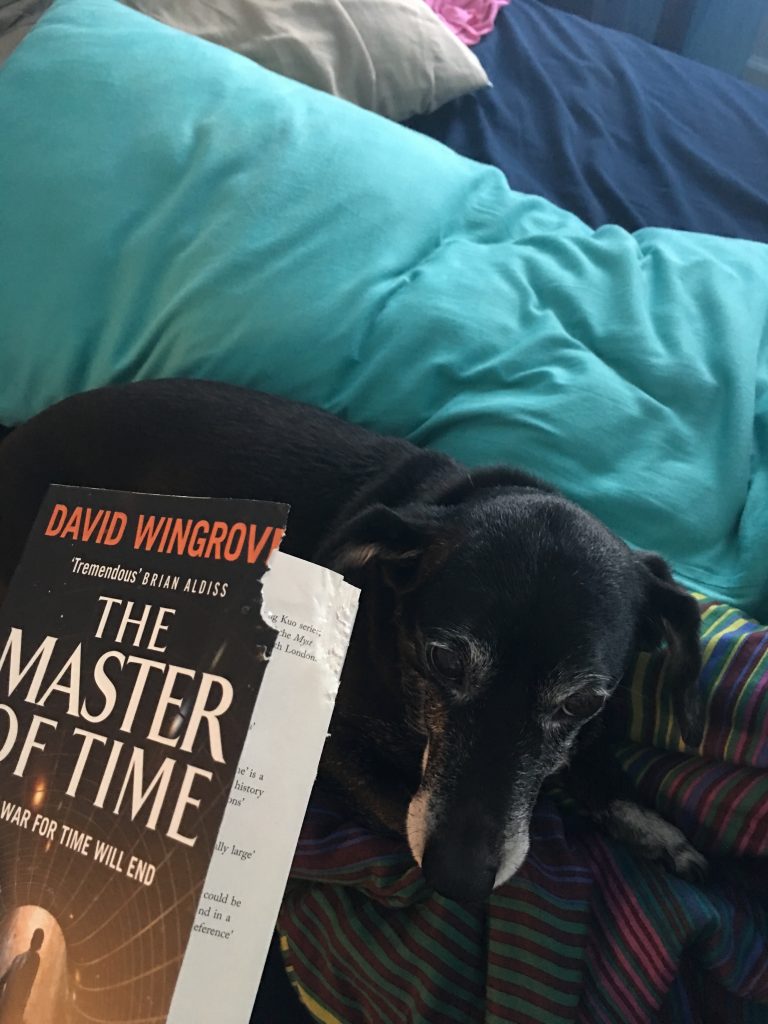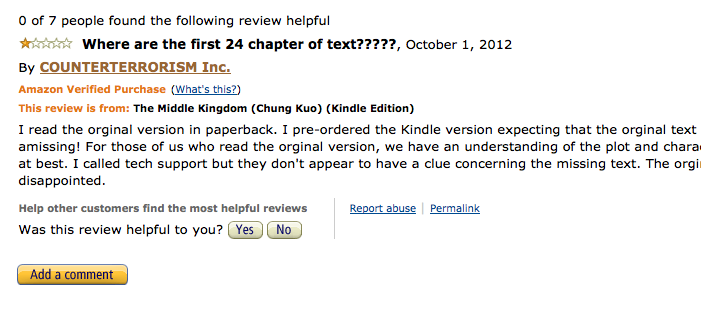New copy on the way… 🙁

Now that Wingrove’s new series Roads to Moscow has found a publisher, I face a dilemma with this site. Should Of Gifts and Stones remain solely focused on Chung Kuo, or should I cover other of David Wingrove’s works as well? Help me out and click on the poll below. Comments are welcome, too.
Some weirdness on the Chung Kuo front to report just one day after the official release of the e-book.
First, it looks like the official site is down. Not sure how long it’s been down — I, like probably most folks, don’t check it too often since there hasn’t been any new material there since around the time Daylight was published — but it’s been long enough for Google to have removed it from their search results. A ping to the site revealed a SERVFAIL error, indicating that the domain exists but the nameservers aren’t returning valid web servers. A whois lookup shows that the domain was updated on September 24th; perhaps the domain was renewed but somebody forgot to renew a hosting plan. In any event, I would chalk this up to purely technical issues and not take this as an indication of hard times with the series.
Next, although the Amazon.com title of the Kindle book was fixed to be”Chung Kuo” instead of “Chung Kao,” it looks like the e-book itself still reflects this error in the header. Oops!

On top of that, the very first review for The Middle Kingdom on Amazon gave the book one measly star, complaining that he was missing the first twenty-five chapters of the book, failing to realize that the chapters and parts are numbered sequentially, beginning with Son of Heaven and continuing through Daylight on Iron Mountain and The Middle Kingdom. Did he not notice that Daylight started with Part 4/Chapter 12?
I can totally understand being thrown off at first by opening to Chapter 26 — I even had a momentary “huh?” moment, but you’d think Mr. COUNTERTERRORISM Inc. (whose other review is for a bunny fun tunnel… maybe a counterterrorist bunny fun tunnel?) would’ve done his due diligence by checking to see if Daylight ended with Chapter 25 before single-handedly sinking the average review of this book. And if Mr. COUNTERTERRORISM Inc. happens to be a reader of this site, well, I’m sorry to put you on blast like this, but you’re ruining it for everyone. Let me explain.

Folks, it comes down to this. Chung Kuo is a masterpiece that didn’t get a fair shake the first time around. We’re all extraordinarily lucky that this epic has been given a new lease at life, but fans have to realize that Atlantic/Corvus is a smaller, independent publisher, not a megacorporation media conglomerate like Random House or Penguin, not to mention that an epic science fiction future history series is already starting off with a niche audience. This series is going live or die based on coverage in industry press, word of mouth, and — you guessed it — reader reviews on sites like Amazon. I can’t help but wonder how many people skipped buying the e-book on Day 1 because of this guy’s misinformation. So please, from a diehard fan who wants to see this through The Marriage of the Living Dark and beyond, I ask you to enjoy and finish The Middle Kingdom and write an honest review on Amazon and other applicable sites. No one’s demanding that you love it or forcing you to give it five stars, but at least contribute your honest thoughts and try to drown out this and any other misinformation that may come up.
In other, slightly happier news, I’ve updated the New to Chung Kuo? and About sections of this site, since they really hadn’t been updated since Son of Heaven and there were a few things to add and/or clarify. Also, work continues on the wiki, where a list of the planned “Expanded Universe” stories has been added to the main page, with David’s synopses soon to follow on those articles. As always, everyone is welcome to contribute to the wiki, whether its creating all-new articles or just fixing typos. Every little bit helps.
And lastly, why the hell are you reading this?? Go read The Middle Kingdom!
Brad Murgen, author and Chung Kuo fan, sent along a link to his review and commentary of the original 8-book series, which he jumped into after reading Son of Heaven and Daylight on Iron Mountain by finding used copies on eBay (which I’ve recommended avoiding if you can help it). His reflections are very thorough, and Brad reaches the same conclusions most readers do upon finishing the series.
If you’re a series veteran, it’s a nice read — it’s sure to bring back fond memories and fuzzy feelings of when you first went through the series. Highly recommended. If you’re new to the series, beware of the (clearly marked) serious, hardcore, detailed, ending-ruining spoilers – many or most of which may not even apply in the recasting. Read at your own risk.
Here’s the link: http://www.bradmurgen.com/2012/08/chung-kuo-last-call-for-greatness.html
Thanks Brad!
What follows is a review of the soon-to-be-published Daylight on Iron Mountain (Chung Kuo Book II), written from the point of view of someone who is familiar with what is to come in the upcoming books. Some minor plot and character details of Book 2 are discussed, but I’ve tried to refrain from overt spoilers. That said, if you want to go in to the second volume with no foreknowledge of what is to come, stop reading here.
It’s a mighty span from rural England of old to the mighty superstructure of icy stacks that we Chung Kuo veterans are so familiar with, but with the second book in the recast series, the span is crossed with the masterful strokes of intrigue, tension, love, betrayal, and survival that Wingrove so constantly delivers. Daylight is in every way more a traditional Chung Kuo book than its predecessor – in Son of Heaven, we only see the City in a stroke – a glimpse on the edge of the horizon. Daylight, however, is framed within the hexagonal stacks of the City, populated with Han characters and culture (note when Jake and Mary share the occasional cup of ch’a).
The bulk of the book is split into two sections – the first focused primarily on Jake’s attempts to build a life for himself in the City by pursuing a chance career opportunity with GenSyn, the second focused on the shifting balance of power between Tsao Ch’un and the Seven culminating in all-out war, punctuated with an increasingly hostile courtroom drama involving Jake. The interweaving of the main plots and subplots is more characteristic of the main sequence novels – there’s more going on here than Book 1 – but it doesn’t reach the breadth of later volumes, understandably.
We’re exposed to a wider range of characters in the second book – significantly more of them Han than the previous volume. And there’s plenty of variation between compassionate, right-doing Han and the antagonistic, malevolent versions to easily dissolve any arguments levied against Wingrove for his so-called “racism.”
Jake, as expected, remains the primary protagonist, and the effects of the passing years and conflicts are realistically evident – he becomes more somber and accepting of circumstances as a man past his middle years, then almost comically curmudgeonly as an old man. The previously elusive Tsao Ch’un is a mainstay in Daylight, and his whimsical, seemingly at-times juvenile attitude towards his power sheds a new dimension behind the building of the City – almost like a toddler with too much power, prone to temper tantrums. He eventually devolves from the cold, calculating tyrannical despot to a genuinely insane madman who’s lost the advantage of what he once had of his logical faculties. Amos Shepherd is present as well, and Wingrove plants a few faint seeds with what is to come with that family.
We’re also treated to a behind-the-scenes tour of the growing GenSyn, which is almost as pervasive in world politics as it is in the main Chung Kuo timeline, and the brief illustrations of the early Ebert family are rewarding. Similarly, although Wingrove doesn’t delve too deeply into the characters of the individual Seven, it’s exciting to see familiar family names of the T’ang (Li, Tsu, Wang), knowing that we’re seeing the seeds of the future’s main characters. Interesting, too, how in some ways (and I suppose I’m thinking more of the Li line here), character traits seem to be inherited – Li Chao Ch’in strongly resembles his descendant Li Shai Tung in his pride, nobility, and inner struggles.
Looking back at the two prequels, the only thing I’ve found remotely disappointing is that we don’t – maybe with the exception of Jake – really get to know the main characters as well as we do in the main sequence, like Kao Chen, Li Yuan, Kim, Ben, etc. This isn’t so much a complaint as it is an observation – with the span of time covered by the first two books it’s impossible to cover as much detail as with, for example, Li Yuan (from his birth in the prologue in The Middle Kingdom all the way through the end of the sequence). But, that said, with Wingrove’s obvious adeptness at creating complex plots and characters, it’s a shame that so much had to be covered in only two short prequel novels – I could easily see this time period expanded into its own sequence. But, such is the nature of the prequel beast.
To conclude, Daylight does exactly what it needs to do to bridge the gap between Son of Heaven and the original sequence, and does it in a beautifully crafted way. Again, Wingrove fails to disappoint.
Daylight on Iron Mountain will be published in hardcover the UK on November 1, 2011. Details about the e-book version are (hopefully) forthcoming on the official site. The publishing program for the remaining books is, evidently, more expedient, at six books a year, and I’m looking very forward to restarting the main sequence (this will be my third time on this adventure). I also understand that a number of short stories within the Chung Kuo universe are well underway, hopefully enough to stand as a separate compilation.
Forum member Hunchback Jack has just posted a hi-res version of the cover art for the new series issuance of The Middle Kingdom, and the official website has a side-by-side of all three covers in sequence. Personally, I’m loving the designs and the continuity from novel to novel, but I’m not sure what do think of the depiction of Fei Yen on the third book’s cover. I always pictured her with finer features – more like Zhong Ziyi, I suppose.
Have thoughts about the new cover? Share your comments. (Thanks Hunchback!)
Spoiler Alert – The section contains details about Part 3 of Son of Heaven.
Some brief thoughts on Part 3, after the break…
Spoiler Alert – This section contains details about Part 2 of Son of Heaven.
My initial reactions and thoughts on Part 2: The East is Red, after the break…
Spoiler Alert – This section contains details about Part 1 of Son of Heaven.
My initial reactions and thoughts on Part 1: The Last Year of the Old World, after the break…